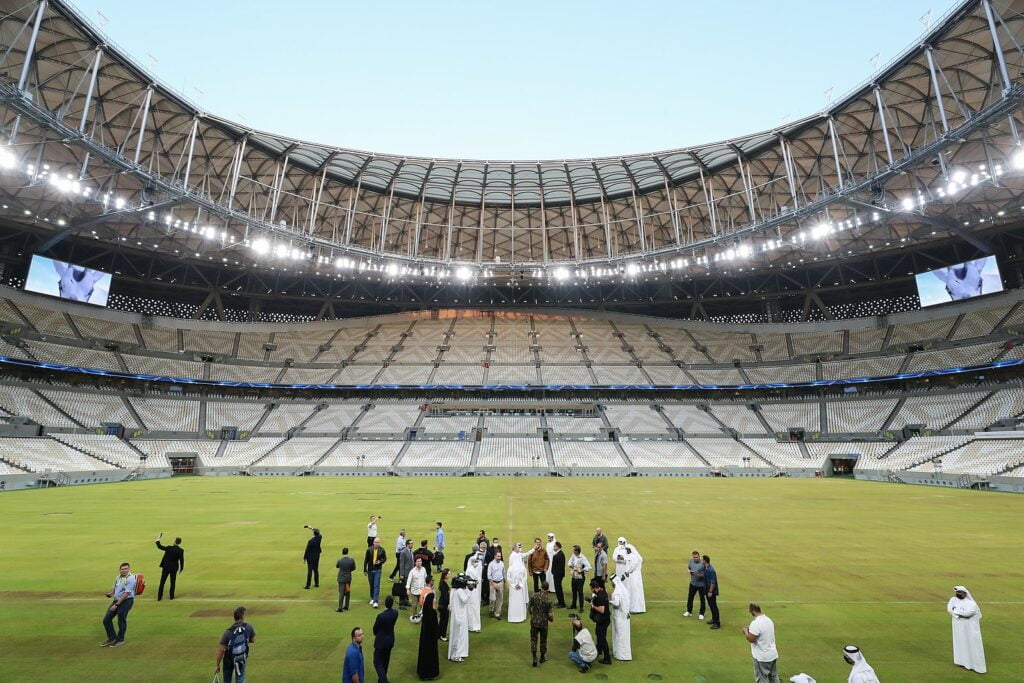The 2022 FIFA World Cup has been taking over international discourse, beyond just sports scores. With the scrutiny already centred on the organisation of the event, the International Federation of Association Football (FIFA) decided to advertise the event as “fully carbon-neutral”.
Todd Smith, a former pilot who quit his job in the face of the climate crisis, said to DW, “With the remaining carbon budget we have, we can’t continue to double air traffic every 15 years, like we have historically.” He elaborates on the injustice of flying, “especially since half of those emissions are generated by 1% of the population.” The FIFA world cup involves 1,300 flights—daily.
Upon investigation by the non-profit Carbon Market Watch, these claims fail to hold water. Their fact-checking report aims to inform the public about the lack of credibility and integrity in the organisation’s sustainability goals.

In 2022, Qatar’s Earth Overshoot day was markedly the earliest amongst countries around the world—implying that the nation’s demand for ecological resources exceeds the Earth’s ability to regenerate from as early as February, the 10th. With Qatar producing some of the highest levels of carbon emissions in the world (owing to its large dependency on fossil fuels), climate experts across the board have treated FIFA’s proclamations with scepticism.
The environmental factors they failed to consider
Arguably, the main players in the mega-sporting events organisation field are the sponsors. Claude Akinsanya, a UK based climate and equity campaigner likened FIFA’s two-faced sustainability goals to “COP27’s sponsorship by Coca-cola, one of the biggest pollutants in the world.” If FIFA truly wanted to achieve sustainability, it would have been imperative to detach itself from organisations that are, in many ways, the ignorant perpetrators of the climate crisis. Instead, FIFA chose to sign QatarEnergy, one of the largest natural gas companies, as a sponsor—because, apparently, they are “responsible for the development of cleaner energy resources.”
The challenge for all of us is to identify and make citizens conscious of what greenwashing is. We need to understand that individual action is not going to make any impact—we need collective voices to hold these corporations accountable. Until that happens, they will keep putting the onus on us (citizens) and get away (with their unsustainable actions).”
Rasmi Mishra, Climate Campaigns Consultant
Any form of fossil fuel is outright unsustainable—it cannot continue to matter if they’re high-emissions or low-emissions, fossil fuels are fossil fuels, regardless. When properly clean solutions like solar energy and wind energy exist, it is redundant to continue to exploit slightly “cleaner” energy sources.

Likewise, with rising global temperatures, there is increasing demand for air conditioning, which in-turn worsens the climate crisis. For people travelling from the cooler European winter climates, AC has been determined as essential for the pristine stadiums. FIFA claims to be using solar-powered AC systems for Qatar’s stadiums, however, whether this will be partially or completely sources is unclear. At the same time, we can’t forget the injustice caused to the thousands of migrant workers who have died as a result of heat stress during the construction of those very same stadiums.
Also read: Decoding The Problematics Of FIFA And The World Cup In Qatar
It is also critical to address the issue of flying to international events. Todd Smith, a former pilot who quit his job in the face of the climate crisis, said to DW, “With the remaining carbon budget we have, we can’t continue to double air traffic every 15 years, like we have historically.” He elaborates on the injustice of flying, “especially since half of those emissions are generated by 1% of the population.” The FIFA world cup involves 1,300 flights—daily.
Moreover, hosts of sporting events have to tackle the issue of maintaining infrastructure, with football fields needing gallons of water monthly. Beyond just carbon emissions, can this truly be said to be a sustainable use of such a precious resource?
Is carbon neutrality truly sustainable?
Carbon neutrality is an often impractical objective, given that they cannot always be verified and are unlikely to be fully efficient. Most carbon neutral schemes work through carbon-offset programs, where organisers and businesses typically pay to reforest/reinstate ecosystems in other parts of the world—in an attempt to cancel out their own carbon footprint. There is, unfortunately, a general lack of transparency in such projects.

And worse still, they perpetuate “carbon colonialism”, which is a concept that explains how entities in the Global North exploit the very resources yielded through the carbon offset projects (which are typically carried out in the Global South). This also implies that the burden of doing the actual planet saving work is only for developing nations, while developed nations can continue to blow through resources and emit carbon in the billions.
Claims by FIFA to “reach carbon neutrality before the tournament kicks off” provide for further confusion—given that, carbon emissions would be created during the event itself. According to the Carbon Market Watch’s report, it would be “unworkable and improbable” to accurately achieve carbon neutrality for an event that hasn’t even begun.
What does the future hold?
“Now that more people (especially young ones) are talking about climate change and its impact, corporations are trying to ride the bandwagon too, in a way that profits them.” Rashmi Mishra, a climate campaigns consultant said to FII, “They are big on lingos, promises and marketing to show what all they are doing to become climate conscious, but they actually never have any detailed plan for accountability.”

While FIFA’s efforts towards sustainability might be appreciable, outright declaring its carbon neutrality is a resort to mere greenwashing. Slippery, vague language and lack of transparency is, thus, a fan-favourite tactic in corporate “sustainability”.
Also read: FIFA World Cup 2022: Is Western Media’s Narrative On Qatar Biased?
Rashmi elaborates on what we, as the public, can do in the face of greenwashing: “The challenge for all of us is to identify and make citizens conscious of what greenwashing is. We need to understand that individual action is not going to make any impact—we need collective voices to hold these corporations accountable. Until that happens, they will keep putting the onus on us (citizens) and get away (with their unsustainable actions).”
Corporates partaking in greenwashing is nothing new. Olympics, world cups, and other parallel events engage in a capitalistic system, where sport is made into an activity for exploitation, emission, and exponential growth. At a time when we critically need degrowth as a justice-centric probable solution to the climate crisis—we must seriously reconsider the positions of glitzy mega sporting events.





I read a lot of things, and I thought the way you wrote to make it clear what you wanted to say was very good. I’m impressed, and I’d like to come back again sometime